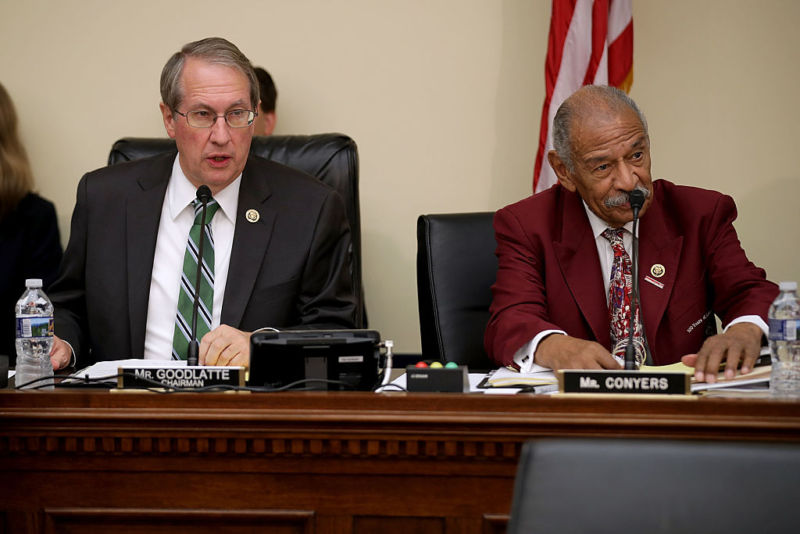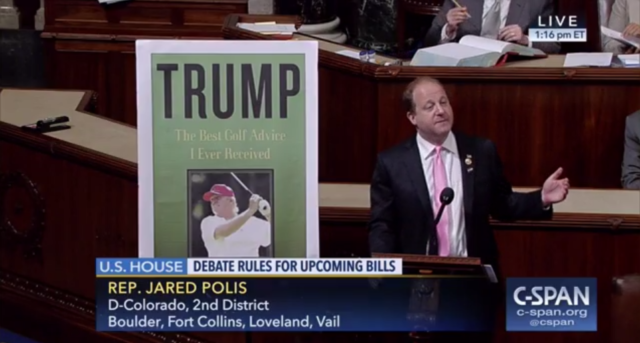
The US House of Representatives will vote today on a bill that will make the US Register of Copyrights a presidential appointment, confirmed by the US Senate.
The bill, H.R. 1695, is being celebrated by big copyright owners and dreaded by public interest groups. It's the result of a power struggle that could dictate how much industry will influence who runs the US Copyright Office.
Currently, the Copyright Office is run by the Register of Copyrights, a position that's appointed by the Librarian of Congress. If H.R. 1695 passes, the Register of Copyrights will be appointed by the president and confirmed by the Senate.
The bill is enthusiastically backed by big copyright holders, including the Copyright Alliance, the Motion Picture Association of America, and the Software & Information Industry Association. It's opposed by public interest groups and trade groups that advocate for a more balanced copyright system, including Public Knowledge, the Electronic Frontier Foundation, and the Re:Create coalition.
Backers say that putting the head of the Copyright Office under legislative control is a proper reflection of copyright's increasing importance in modern life. Bill opponents say the process will become more politicized than ever and that passing H.R. 1695 will ensure the copyright office is controlled by industry. In their view, the bill is a step backward that will ensure the Copyright Office continues to take the side of large entertainment and media companies.
New Librarian, controversial firing
To understand where the bill is coming from, one needs to review some recent personnel changes at the Library of Congress. Last year, James Billington stepped down as the Librarian of Congress after serving for nearly 30 years. Then-President Barack Obama nominated Dr. Carla Hayden, who had run the 22-branch Enoch Pratt Free Library in Baltimore for more than 20 years. In July, the Senate confirmed Hayden on a vote of 74-18. She became the 14th Librarian of Congress in September. Hayden was the first woman and the first African-American to hold the position.
Shortly after taking office, Hayden made a major personnel move. She reassigned the Register of Copyrights, Maria Pallante, to a lesser position. Rather than take the demotion, Pallante left government.
There's no indication that Hayden's move had anything to do with copyright. Still, it alarmed industry. While she was in office, Pallante was an advocate for major copyright-holders.
The Copyright Office "has not been a neutral advocate," EFF Policy Strategist Kerry Sheehan wrote in a blog post about H.R. 1695. Under Pallante's leadership, the Copyright Office supported the doomed SOPA anti-piracy bill. When the FCC took on a contentious issue about set-top boxes, Pallante's office worked closely with Hollywood. The Copyright Office met with the MPAA before even meeting with the FCC and took the side of Hollywood on the issue.
Pallante once said "copyright is for the author first and the nation second," a quote that activists for balanced copyright never forgot.
An inspector general's report slammed Pallante's leadership of the Copyright Office, noting that nearly $12 million was spent over five years on a new computer system that didn't work right. Many copyright records from before 1972 still aren't available online.
"The systems for recordation and registration are outdated," said Public Knowledge's Ryan Clough in an interview with Ars.
Hayden simply "said she's going to do her job," Clough said. "That provoked a reaction. It's hard to see this bill as anything other than a rebuke to the current Librarian for removing the Register and exercising oversight that was long overdue."
The bill was passed out of the House Judiciary Committee last week on a vote of 27-1, with only Rep. Zoe Lofgren (D-Calif.) voting no and writing a lengthy dissent (PDF).

"The Register of Copyrights is an extremely important position to the US economy, creativity, and culture, which should be acknowledged by making the role a presidential appointee subject to Senate confirmation," said Copyright Alliance CEO Keith Kupferschmid, celebrating the bipartisan vote to move the bill forward.
Debate on the House floor
Proponents who spoke on the House floor today, including Marsha Blackburn (R-Tenn.), called it a "commonsense measure" that was just the first part of modernizing the office. They noted broad support by unions like the AFL-CIO and the Screen Actors Guild, as well as entertainment and software companies and some conservative political groups.
Rep. John Conyers (D-Mich.), said the bill was part of more than four years of discussions about modernizing the office. "We want a Copyright Office that's responsible to all stakeholders in the ecosystem," he said. "Core copyright businesses annually contribute more than $1.2 trillion to our nation's economy. These businesses are also tremendous job creators, creating more than 5 million workers."
Opponents argued those were general discussions and that there was no hearing at all on H.R. 1695.
"I'm sorry, it is about the Librarian," said Rep. Zoe Lofgren (D-Calif.). "Dr. Carla Hayden is probably the most qualified Librarian of Congress who has ever served" and has done more to modernize the Library and Copyright Office in six months than her predecessor did in decades, she added. "If we prevent her from appointing a new Register, that effort will be stalled, and that would be tragic."
"Special interests will be involved in picking the person who makes decisions over copyright," said Rep. Jared Polis (D-Colo.) during debate today on the House floor. "Congress is choosing big powerful interests over consumers, over innovation, and over the little guy."
Polis called it a "micro-management" of personnel issues and also noted that President Trump himself has dozens of copyrights, including his books of golf and business advice. The president could put "a big-business friend in a position that could help him and his family," Polis noted.
"This is about policy and moving forward," said Rep. Doug Collins (R-Ga.), who called the negative talk about Pallante "character assassination" and said the bill isn't about retaliating against Hayden. "We believe the very heartbeat of the innovative system is the copyright system. I'm looking out for the singer-songwriter, the person at home writing their first novel or first article. This is the little guy we're talking about. We're talking about a Register that has so much work in our economy, it's just the first step of modernization."
The House passed the bill at around 3:30pm Eastern time, on a final vote of 378-48. The Democratic caucus voted in favor of the bill, with 145 House representatives voting yes, and 46 voting no. Republicans voted in favor of the bill almost unanimously, with 233 voting in favor and two voting against. This article will link to a final vote count when it is available.
The bill will now move to the Senate whenever leadership schedules the matter.
reader comments
84